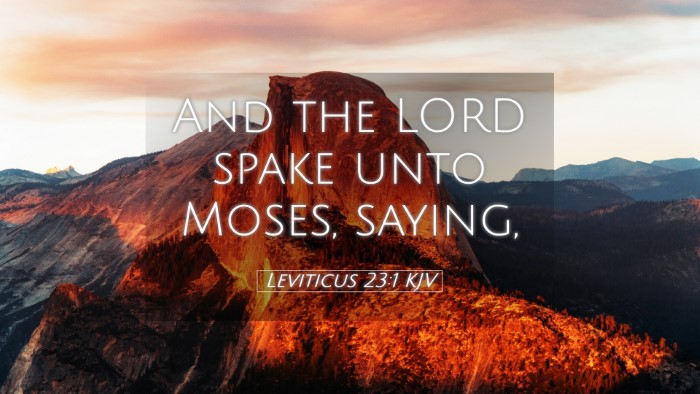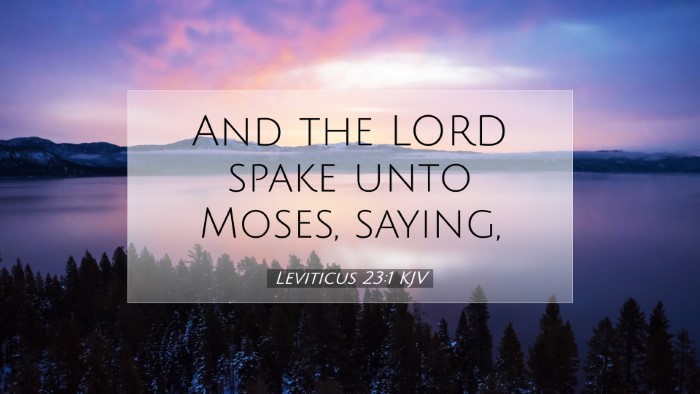Commentary on Leviticus 23:1
Verse: “And the LORD spake unto Moses, saying,” (Leviticus 23:1)
Introduction
This verse serves as a pivotal introduction to one of the most significant chapters in the book of Leviticus, outlining the appointed feasts of the Lord. The inclusion of the phrase, "the LORD spake unto Moses," emphasizes the divine authority and importance of the instructions that follow. In understanding this chapter, it is essential to contextualize it within the broader framework of God's covenant with Israel and its implications for worship and communal identity.
Divine Authority in Communication
Matthew Henry notes the weight of this divine communication. The phrase underscores that what follows is not merely human tradition or suggestion, but a command from God Himself. This underscores the seriousness of God's requirements for worship, contrasting the often casual or indifferent attitudes towards worship observed today.
Albert Barnes expands on this notion by affirming that God reveals His will through appointed times and rituals, which instill a sense of order and purpose in the community. The specificity of God’s instructions reflects His desire for His people to engage with Him through designated times of observance.
Significance of Appointed Times
Leviticus 23 continues with detailed descriptions of the Jewish feasts, which hold theological and historical significance. Adam Clarke highlights that these festivals are not merely occasions for celebration but serve to remind Israel of God’s providence and redemptive history.
- Sabbath: A day of rest reflecting God’s creation and covenant.
- Passover: Commemorating deliverance from Egypt and foreshadowing Christ's sacrifice.
- Pentecost: Celebrating the harvest and the giving of the Law, representing God’s provision.
- Feast of Tabernacles: Remembering wilderness wanderings and God's continual guidance.
Each of these feasts expresses a unique facet of Israel's relationship with God and their identity as His chosen people. The systematic nature of these observances serves to foster a collective memory of faith and dependence on God.
The Role of Leadership in Worship
The directive addressed to Moses highlights the role of spiritual leaders in communicating God's instructions to the people. Pastoral function, as discussed by Henry, involves not just teaching but also vigorously encouraging adherence to God’s statutes. This is vital in ensuring that the community maintains its focus on God amidst competing cultural influences.
Barnes eloquently notes that God's instruction to Moses involves a responsibility placed upon leaders to relay His commandments faithfully. The expectation is that leaders are to guide the congregation in understanding the deeper spiritual significance of these celebrations, promoting both reverence and joy in worship.
Lessons for Today
The contemporary application of this verse resonates deeply with the church today. The reminder that "the LORD spake" serves to emphasize that Scripture is God's revelation and continues to hold authority over Christian practice. The observance of holy days and the organization of communal worship should be approached with the reverence expected of God’s people.
Clarke reminds believers that while the ceremonial law has been fulfilled in Christ, the principles underlying these commands—such as rest, thanksgiving, and communal remembrance—remain integral to Christian faith and practice. The church is called not merely to observe rituals but to infuse them with heartfelt worship that acknowledges God’s continual presence and activity in the world.
Conclusion
In summary, Leviticus 23:1 serves not just as an introduction to the laws of worship in ancient Israel but as a profound reminder of God’s ongoing communication with His people. This verse encapsulates themes of divine authority, communal identity, and the essence of worship, which are highly relevant for pastors, students, theologians, and Bible scholars today. As the church reflects on the feasts and festivals outlined in the rest of the chapter, it becomes evident that engaging with the divine commandments profoundly shapes communal and personal faith.


